#corpus cambridge
Text
Today, I say goodbye to England...
**warning: emotions and ramblings ahead. 😆
I'm toasting the end of what I'm fondly calling my "2023 World Tour" 😆 I've been home for exactly 7 days since the end of May. I've traveled over 25000 miles over 7 weeks to Asia and England. I've packed and unpacked over 20 times and have been on countless planes, trains, and automobiles.
This last week, I've been overwhelmed with emotions I can't quite fully place yet--but they all seemingly revolve around an aching theme of feeling bittersweet about new and old experiences and longings.
(Well, THAT was a plot twist I didn't expect on this trip. 😂)
There are certain growths that can only be experienced through pushing beyond comfort zones. I was, surprisingly, stronger, less introverted, and more flexible than I ever expected. There were challenges and new things: the nostalgia of old friends and old haunts; the paying of respects to those that are no longer with us; the visiting of those I grew up with; the first time meeting of a longtime online friend.
As exciting as all of this travel has been, I'm ready for home. Maybe it's the absence of routine and home comforts, or maybe it's the mental shifts required for traveling this long and traveling alone, but I seem to be more emotionally vulnerable during this last week. That bittersweet feeling I've had all week hasn't wanted to let up, and I've been trying to chase down all the reasons behind this feeling.
Visiting places that had helped shape the person I am today, 22 years ago, is in itself, bittersweet. I remember 20 year old me thinking about the passions of the future and yearning for more. I've changed quite a bit, yet the buildings and memories remain. It is an odd feeling of time flying by, yet standing still.
I've pondered a lot about the magic of connections on this trip, juxtaposed with the blessed angst of being someone who feels too much. Every touch, every step, every memory, every feel--I want to capture it all like lightning in a bottle, yet it's almost too much to take in all at once some days. I tell myself to breathe, but sometimes I can't quite catch my breath because I feel so much. Wanting to live a full life can be quite overwhelming for introverted souls who feel too much, but I am so blessed to have the fortitude and opportunities to live fully--albeit sometimes a bit crazily 😆
When you think about the growth of a person throughout their lifetime and the range of intense emotions, experiences, thoughts--it's really quite amazing.
I know my blog hasn't exactly been on "fun smut" brand this last week, but I've always been authentic here. And what has been authentic this week has been....well...a lot of writing, emotions, and processing. I believe in balance-- and I believe that to each irreverent light fun side, there is a darker, more soulful, extremely sensitive side lurking right beneath the surface. I've definitely been more of the latter this last week.
If you've read this far, thank you. This was a needed catharsis for me and a step in processing everything.
So, where to go from here?
I'm not sure. It will take me a minute to mentally and emotionally decompress, unpack, and process all the experiences I've had over the last 2 months. My posts have always been mood-dependent and my moods have been all over the place so......stay tuned 😆😂
Since I can't do anything in a normal, typical fashion--I just have to go with the flow and say cheers to adventures and unexpected soul-searching vacations. I will still take living passionately and deeply over feeling nothing at all most days....
But a break for the rest of today might be a good idea. Or else I'm drinking on the plane.😂
After all this rambling, The Corpus Clock and all that it represents seems appropriate for this post 😂
Onward...
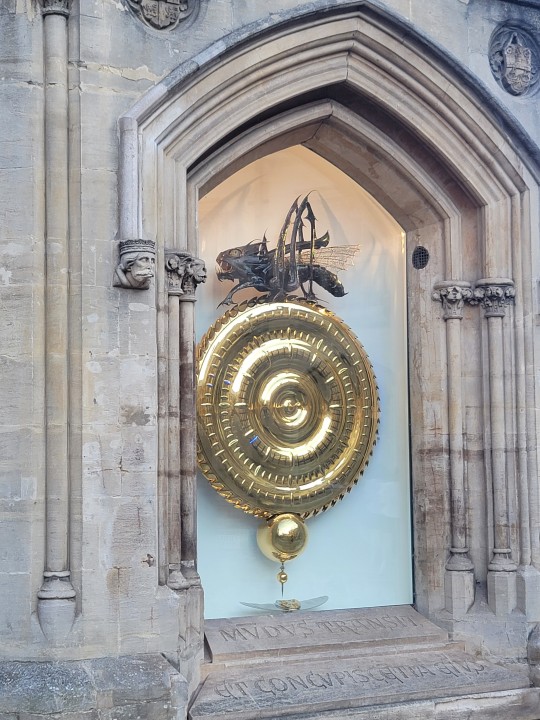
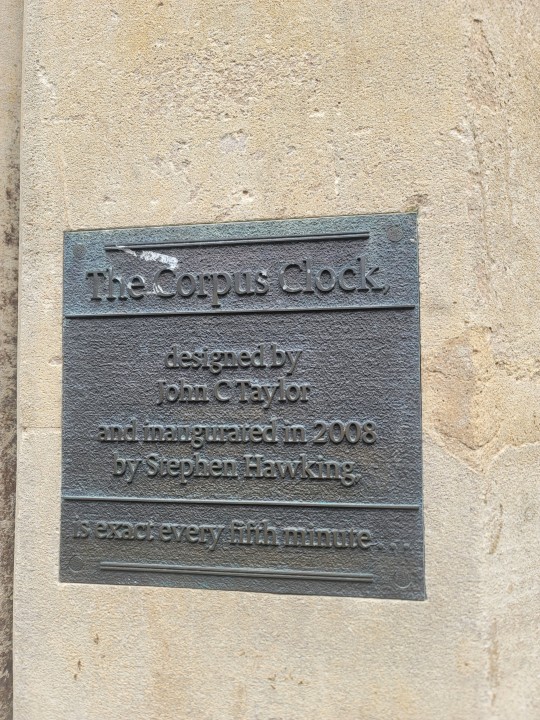
#ramblings and musings#england#adventures#my travels#all the feels#total infj moment 😂#cambridge#corpus clock
135 notes
·
View notes
Text
as an academic who studies academia, it tracks that john, the man who turned himself into a god, was an academic*
*this is not a compliment
#john gaius#ejg#nona the ninth#ntn spoilers#the locked tomb#let’s talk about fucked up power relations and levels of hierarchy and how that enables violence!#also john ‘just some guy’ was not ‘just some academic.’ he’s a cambridge phd grad that’s the ‘corpus’ ref#steeped in tradition and elitism while also surely facing racism and never Quite belonging even though he was clearly smart enough#to be there
10 notes
·
View notes
Text
@jegulus-microfic | April 18: sock | 1.6k
James is sexiled and decides to spend time with Regulus.
There’s a sock on the door knob.
It’s been a long day and James is tired and there’s a fucking sock on the door knob and if he listens close enough he can hear soft grunts.
He’s happy for Sirius and Remus, really, he is, he just wishes that they’d fuck at Remus’ every now and then, and at least keep it to the bedroom.
Sirius and James share a college flat with Peter, Marlene and Lily, so there aren’t many options when they’re all out. Today, James knows that Peter and Lily have chess club, and Marlene’s training for the women’s boat race, so it’s only him who’d be around.
He sighs and turns around, sending Regulus a text as he goes.
Been sexiled – your dorm free?
He’s walking before he’s received a response – he’s almost positive that the answer will be ‘yes’, and he hasn’t seen Regulus in a week, so they’re long overdue a catch up.
Their friendship was one of the more unexpected things to come out of Regulus bucking centuries of Black tradition and instead following in his brother’s footsteps, choosing Cambridge over Oxford. He settled in nicely to Corpus Christi, flying through his first few years as a history undergraduate while Sirius and James chose Trinity instead.
It took a while but slowly and tentatively Sirius and Regulus attempted to heal their relationship, strained by Regulus’ years at Harrow after Sirius packed up and left when he was sixteen, dropping out and enrolling at a local state school instead. They’re much better now; their barbs at each other aren’t quite as jagged. There’s love there, now, rather than just animosity.
As Regulus and Sirius attempted to mend their relationship, James and Remus had been called in early on to mediate, or sometimes it was Regulus’ friends, Evan and Barty, or even Pandora. From those early tentative meetings in neutral territory, new and interesting friendships bloomed, most of all between Regulus and James.
From early study sessions, it evolved into coffee dates and library outings, and when Remus and Sirius sorted their shit out it became even more frequent – the pair never make James feel like a third wheel, but nonetheless they deserve time to themselves, even if James would prefer for them not to fuck on every and any available surface in their dorm.
Regulus is a comforting presence for James; he doesn’t demand anything of him. James is naturally an extrovert; always the centre of a room, but sometimes he needs to recharge, and Regulus lets him do that. He reminds James of calm waters on a spring day, and whenever James needs to quiet his mind, he finds the youngest Black. He only hopes he offers Regulus some of the same comfort in return.
That, and maybe something more. Maybe he hopes that one day there’s a sock on his door knob, and that the reason is Regulus..
James is drawn out of his thoughts as his phone dings.
Sure – text me when you’re here, will come meet you
It’s a five-minute walk but James makes it there in two, calling Regulus to get him to buzz him in. He’s a familiar figure amongst the second years at Corpus, and he’s pretty sure a few of them will have also texted the youngest Black to alert him to James’ presence.
The college door opens and Regulus emerges, dressed in sweatpants and a Trinity rowing sweatshirt that James left last time he was over. He’s so lovely, James thinks, an impulse he doesn’t know how to control; isn’t sure he wants to control it.
“Sexiled, huh?” Regulus holds the door open as James steps through, falling into step with each other and walking up a flight of stairs to reach Regulus’ dorm. It’s empty, although that isn’t uncommon for Regulus. Barty and Evan hold unsociable hours, and Regulus, Pandora and Dorcas have a frankly insane amount of extracurriculars to attend, so they’re rarely together.
“There was a sock on the front door and I’m pretty sure I could hear noises so I didn’t want to risk it,” James says, settling himself in the kitchen, finding Regulus’ mug and a new one with a deer in glasses; a ‘congratulations’ for James’ performance in the inter-college boat races that’s become a permanent fixture in Regulus’ dorm.
He locates the teabags; Yorkshire for James, organic for Regulus, before turning back to the mugs.
“I don’t blame you – those two seem to spend more time fucking than not – it’s a minor miracle they get any work done,” Regulus chuckles, gently bumping James’ hip to get to the fridge, taking out his oat milk and James’ rice milk.
They settle into the routine like it’s second nature; they’re familiar with each other in a way that’s almost intimate. They stand together waiting for the kettle to boil, perhaps a bit too close for it to be entirely platonic, but James isn’t going to move away if Regulus doesn’t.
He always feels like they’re teetering on the edge of something more than what they are, something better, but for all of James’ bravery, he isn’t sure how to make the next move, and he doesn’t want to wreck this peace that Regulus and his brother have been working so hard on.
“So, how was your day?” Regulus asks, tilting his head to better look at James. He looks unbelievably soft in James’ jumper and James thinks that if he just moves his pinkie he can link it with Regulus’.
“Exhausting. I had rowing first thing and a few readings to do for my supervision that I’d completely missed,” James sighs. He loves his degree but he’s never been as organised as Regulus, who seems to have work done almost before it’s set. “Also, I spent a solid ten minutes looking for that jumper.”
A light blush creeps up Regulus’ cheeks at that. “Sorry, you left it here after practice last week so I washed it but completely forgot to text you.”
A smile falls across James’ face. “You’re fine, Reg, and besides, it suits you. I guess I should get myself a Corpus one to match, huh?” He smirks as the red of Regulus’ cheeks becomes more pronounced.
The kettle whistles and Regulus turns away from James to fill their cups. “James Potter, behave yourself.” He hip checks James again, this time with a bit more force. Except he doesn’t move back. He stays there, leaning against James, and James feels like his entire body’s a livewire.
The tightrope they’re walking is getting more taut, and James finds himself eager for the fall.
“But Regulus, dearest, where’s the fun in that?” He leans forward, entirely too close for it to be platonic, and Regulus is turning, turning-
“Ow! Fuck!” James forgot about the fact that Regulus was holding a kettle of boiling water, and he’s paying for that now. Water splashes over the counter as Regulus rushes to put the kettle down, taking James’ hand and leading him over to the tap.
He turns the cold water tap on, letting it flow over their entwined hands. He is too still, too silent, and James wants to go back to where they were. He wants the tightrope back. He wants to fall.
He can be brave, he thinks, if it means he gets to have something with Regulus.
Regulus is staring intently at their entwined hands, like it’s the most fascinating thing in the universe, and James breaks the silence.
“Reg-”
“What are we doing, James? We’ve been tiptoeing around each other for weeks and it’s driving me insane and I want to be around you all the time and I think I’m already half in love with you so I’d love if you can clear up what this is,” he states, false bravado injected into his tone, but James can hear the tremors. He’s so nervous, but so brave. Regulus Black, the Lion Heart.
It takes a while for the words to register in James’ head.
Oh.
Oh.
James removes his hand from the running water, ignoring the slight sting and the inevitable burn that will be left. He cups Regulus’ cheek, forcing the younger boy to look at him. Regulus is terrified, but so hopeful.
“Reg, I- I want-” James runs his hand through his hair in frustration. He can’t get his words out.
“Jamie?” Regulus’ voice is so soft, as though he’s worried he’ll scare James off, and the only thing James can do is kiss him.
Regulus’ lips are rough, a bit chapped from where he nibbles on them when he’s nervous. He tastes of tea and cinnamon and James wants to devour him. There is nothing soft about it. James’ tongue darts out, soothing Regulus’ lips, and the younger boy lets out a moan that’s pure filth and ecstasy and James is falling, falling, fallen.
He wants to do this forever.
His hands find their way to Regulus’ waist, tracing the skin underneath the Trinity sweater that’s been driving James insane since he first saw Regulus wearing it. It’s his, it’s him.
They break apart to breathe and James attaches his lips to Regulus’ neck, marking, claiming. He can’t think beyond this moment, beyond the boy in front of him.
“Jamie, we should- we need to-” he cuts himself off, broken sighs escaping his lips as he tangles his hands in James’ hair.
James reluctantly removes himself from Regulus’ neck, taking the boy’s face in his hands. “Do you want this, Reg? Do you want me?”
Regulus’ eyes trace James’ face, and whatever he sees softens him.
“Always, Jamie.” And James is lost.
They’ll talk about it later, as the sunlight paints the walls of Regulus’ room, but this is enough for now. For ever.
And if Barty finds a sock on the door knob when he comes back from the library, well, that’s between him and Regulus.
#jegulus#regulus black#James potter#starchaser#marauders#marauders era#sunseeker#jegulus microfic#dead gay wizards#si writes#will I ever figure out how to write a microfic that's actually micro? doubtful.
1K notes
·
View notes
Text
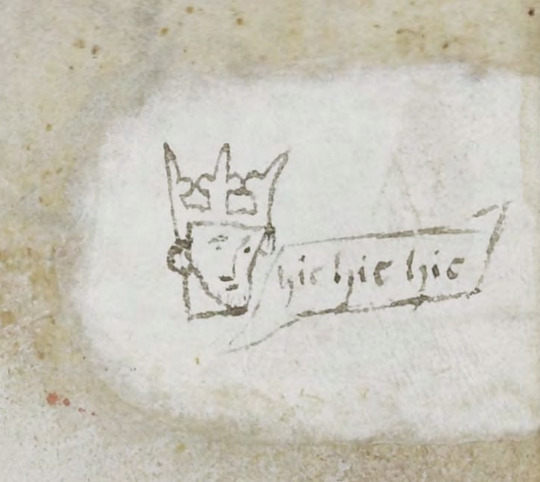
St. Edmund, decapitated, cries ("hic, hic, hic") in the margins of a 12th century Bible
MS 002III (The Bury Bible), f. 322r
Cambridge, Corpus Christi College, via red_loeb
969 notes
·
View notes
Text
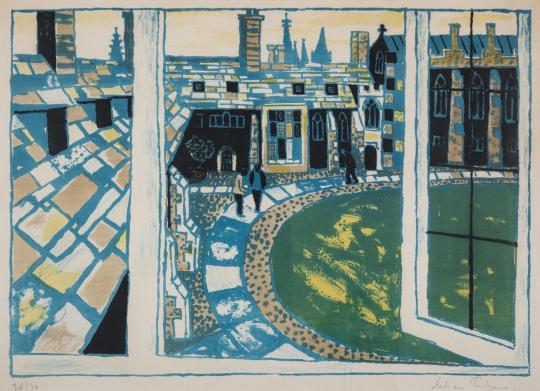
Julian Trevelyan (1910-1988)
Corpus College, from Cambridge Suite.
122 notes
·
View notes
Text

Corpus Christi College, Cambridge, UK
31 notes
·
View notes
Text
btw since we’re talking about John Gaius + his melodramatic ass tendencies to quote Shakespeare and act like he’s living out the plot of The Eumenides, I would also like to shed light on a little-know bit of melodrama from the galaxy’s worst babygirl

This passage he quotes in HtN is the incipit of Psalm 27, but also the motto of the University of Oxford, where John likely did a research fellowship. There’s a Corpus [Christi College] in Cambridge as well, but Taz lives in Oxford and I think it was intentional; I’m going to go ahead and call out EJG for renaming the sun after a slogan that reminded him of his academia days and probably made him feel extra intellectual.
Yet another reference that nobody else in the galaxy will ever understand because he made damn sure that was the case. Highbrow quotes and none pizza left beef memes, who else’s doing it like him!
#can you believe he preserved the currently DEAD language of latin just so he could speak it & impress absolutely no one#THE absolute worst babygirl but also the funniest#ejg#I want to point and laugh at him for this but also. as usual.#I am confronted with the terrible reality that if I became god I too would be this self-referential and obsessed with my own lore#the locked tomb#tlt
228 notes
·
View notes
Text
I've almost finished putting together my portfolio for Registration (the process by which a probationary PhD student gets confirmed as an actual PhD student at the end of their first year in Cambridge; different unis have different terms for this). It includes a draft table of contents, which I thought might be of interest, so here's what I'm currently claiming I intend to cover:
Draft Table of Contents
Introduction:
Definitions of friendship (philosophical and literary)
Introduction to corpus and manuscripts/editions
Review of prior scholarship
1. Verbal affection and the language of friendship
1.1 Popa
1.2 Comalta, comhdhalta, dalta and oide
1.3 Cara, caratrad,and cairdes
2. Oaths and service
2.1 Friend and avenger: Conall Cernach and Cú Chulainn
2.2 Friends from abroad: cara as ally
2.3 Sworn brothers?: Cú Chulainn and Láeg
3. Bodies and bonds: physical affection and markers of friendship
3.1 Shared graves and homes
3.2 Kissing and physicality in the Irish tradition
3.3 Courtly love and the presence/absence thereof in Irish prose
4. Virtuous friendship
4.1 Critique and guidance: the philosophers’ ‘true’ friendship vs sycophancy
4.2 Classical and/or Christian virtue: friendship and society
4.3 Dangers and failures of friendship
Conclusion:
Nature of friendship in the Irish tradition and its expression in my corpus
Summary of reasons for change/development
Further work to be done
Of course, this is not very informative, because each of these headings (whether deeply vague or highly specific) is serving as a placeholder concept for a broader idea or theme: the chapter about Conall and Cú Chulainn, for example, is looking at more aspects of their relationship than simply Conall as Cú Chulainn's avenger, though it will be using Oidheadh Con Culainn as a starting point. Many characters and relationships will recur repeatedly in different sections -- I anticipate Fer Diad coming up in 1.2, 1.3, 2.2, 3.2, and 4.3 at the very least, and Láeg will be discussed throughout, too.
In theory, if each sub-section is around 5,000 words, then each chapter will be 15,000 words, which means my chapters will come to 60,000 words overall and leave 10,000 words each for the Introduction and Conclusion. In practice, however, I suspect that strict 80,000-word limit is going to be an absolute pain and I am going to spend half of third year trying to make everything shorter 😅
16 notes
·
View notes
Link
This is the gospel book that was carried in procession at the coronation of Charles III. Special Collections Library Twitter has been, well, atwitter.
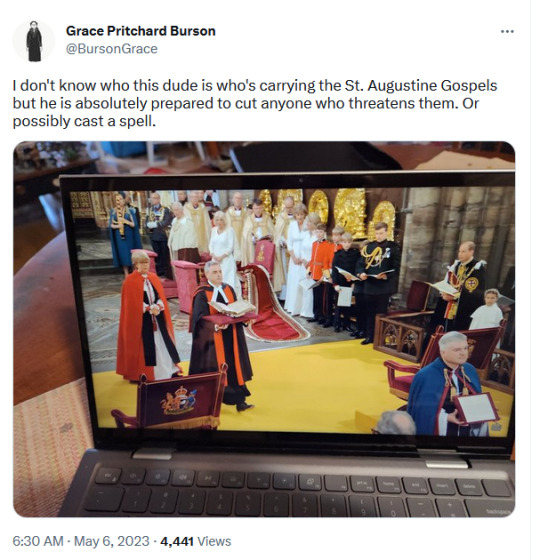



55 notes
·
View notes
Text

Remember, an elephant is not just for Christmas!
If you are a medieval ruler like Henry III who received an elephant from his brother-in-law (St) Louis IX of France in early December 1254, be prepared to spend:
£6 17 shillings 5 pence (refund to the sheriff of Kent for transporting the elephant from France to England)
£22 20 pence on a multi-purpose elephant house at the Tower of London
£24 14 shillings 3½ pence on food for the elephant every nine months
By comparison, a laborer might earn just 1-and-a-half pence per day, while a well-to-do knight might live on £15 per year. (For more, see Cassidy's and Clasby's article from the Fine Rolls of Henry III Project.) And don't forget, you will have to pay for the elephant's keeper, too! The monk-chronicler Matthew Paris helpfully depicted Henry III's elephants alongside one of its keepers for scale. The man is labelled as Henry de Flor, "mag[iste]r bestie" ("caretaker of the beast").
Sadly, Henry did not have these expenses for long: although many medieval legends emphasized elephants' longevity, this elephant only lived until 1257 in the inhospitable northern climate. When it died, it was initially buried in the tower, but Henry later had its bones transferred to Westminster Abbey.
Despite these difficulties and costs, elephants had a notable history as diplomatic gifts in the Middle Ages, even in regions where elephants did not naturally live. Charlemagne's elephant Abul Abbas is a very early example of the phenomenon, and by the eleventh century Byzantine emperors were receiving elephants in Constantinople. In 1228, the Holy Roman Emperor Frederick II received an elephant from al-Kamil, the ruler of Egypt, and King Louis IX probably also received his elephant from an Egyptian ruler before regifting it to Henry III.
Side note: although the "white elephant" gift exchange claims to be based on a southeast Asian ruler's practice of punishing courtiers with a gift that would cost them a lot of money, there is not much historical evidence for this before the story was shared in the Anglo-American world in modern era.
Some elephants fought back over being passed around as gifts, though. In the early 15th century an elephant and other rare animals arrived in Japan. (Martha Chaiklin has suggested that they were intended as a diplomatic gift for someone else, but were blown off course and ended up with the Ashikaga shogun.) The elephant was extremely grumpy and trampled some courtiers, so the shogun regifted it to Taejong, ruler of Korea. The elephant continued to trample courtiers in Korea and was expensive to feed, so Taejong exiled it to its own private island, where it continued to live.
Materials: parchment, ink, and pigments
Contents: Matthew Paris's Chronica Maiora
Origin: St Albans Abbey (made by the scribe-illuminator-chronicler-monk Matthew Paris)
Now Cambridge, Corpus Christi College, MS 16 I, f. ii r
#elephant#elephants#medieval elephants#illuminated manuscript#13th century#medieval#elephants as gifts#unique gifts#medieval gifts#global middle ages#diplomacy
14 notes
·
View notes
Photo

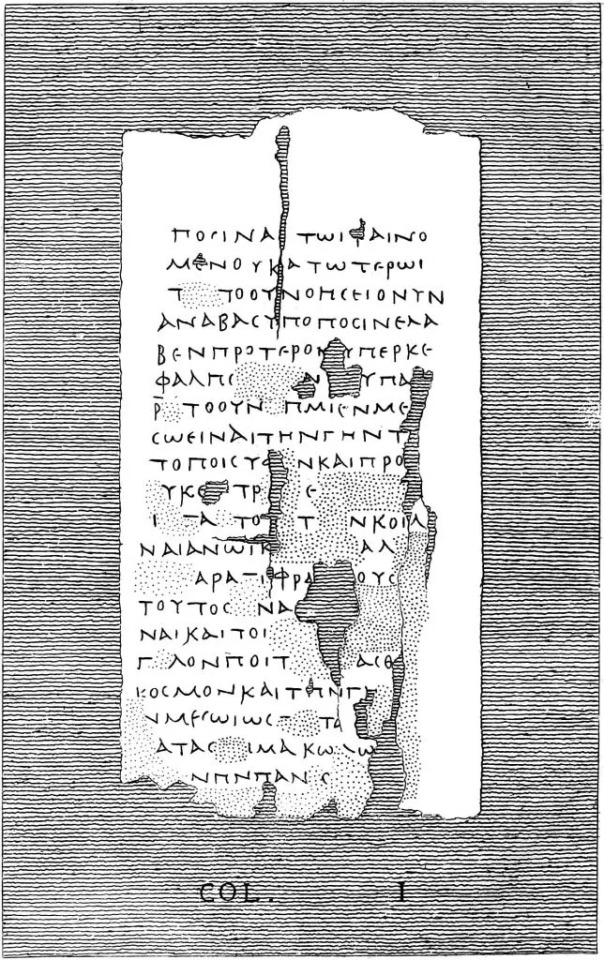

Ancient Latin Texts Written on Papyrus Reveal New Information About The Roman World
Researchers funded by the European Union have deciphered ancient Latin texts written on papyrus. This work could reveal a lot about Roman society and education, as well as how Latin’s influence spread.
Although the number of Latin texts found on papyrus dating from the first century BCE to the eighth century CE has grown as a result of new archaeological discoveries, these texts are frequently not given the attention they require. Therefore, they represent a vast untapped source of information and insight into the development of ancient Roman literature, language, history, and society.
Latin texts on papyrus in particular could provide information about the period’s literary and linguistic emigration. This might also reveal more about the educational environment, and paint a clearer picture of the Roman economy and society.
New approach to Latin texts
The EU-funded PLATINUM project, which was funded by the European Research Council, was launched to achieve just this. It began with a preliminary census of existing Latin texts on papyrus, in order to assemble and update collections.
“A key innovation was the multidisciplinary way we worked on these texts, bringing them under the spotlights of Latinists, linguists, historians – of Classicists, in general,” explains PLATINUM project coordinator Maria Chiara Scappaticcio from the University of Naples Federico II in Italy.
This work was pulled together to produce the Corpus of Latin Texts on Papyrus, six volumes of which will shortly be published by Cambridge University Press. “This is the major output of the project,” adds Scappaticcio.
“This work collects all the texts of interest, and offers scholars a reference source and tool. Its importance is clear when one compares what we knew about Latin papyri before PLATINUM, and what we know today.”
Groundbreaking linguistic findings
Several interesting findings were made in the course of the project. These include the startling discovery of Seneca the Elder’s Histories. “None of us could have imagined that such an important work would be found in one of the charred papyri from Herculaneum,” says Scappaticcio. “A new chapter in Latin literature has been rewritten thanks too PLATINUM.”
In addition, many previously unknown texts are now circulating among scholars as a result of the project’s work. The team has helped to forge new partnerships and exchanges between academic and cultural institutions.
“We also discovered the only known Latino-Arabic papyrus,” remarks Scappaticcio. “In this text, the Arabic language has been transliterated in Latin script. This text is unique and provides evidence of interactions between Latin language and culture, and Arabic language and culture in the early medieval Mediterranean.”
Cultural interactions uncovered
The PLATINUM project has helped to shine new light on the spread of Latin, especially in the provinces of the Late Antique Roman Empire.
Careful examination of the actual books, tools and materials that were circulating at the time has provided insights into, for example, how Latin was taught as a foreign language.
“We know now that Latin literature was circulating in the Eastern Roman Empire, and how this literature might have shaped knowledge,” notes Scappaticcio. “One of the main reasons for learning Latin, for example, was the necessity of familiarising oneself with Roman law.”
Scappaticcio believes that this research will benefit not only ancient historians and classical philologists, literates and linguists, but also cultural historians. “The work has opened the door to better understanding cultural interactions at the time,” she says.
“The work of PLATINUM touches on Roman Orientalism, as an aspect of multiculturalism in Antiquity and Late Antiquity.”
By Leman Altuntaş.
#Ancient Latin Texts Written on Papyrus#platinum project#european research council#herculaneum#latinists#linguists#historians#ancient historians#ancient artifacts#history#history news#ancient history#ancient culture#ancient civilizations#roman history#roman empire
24 notes
·
View notes
Text
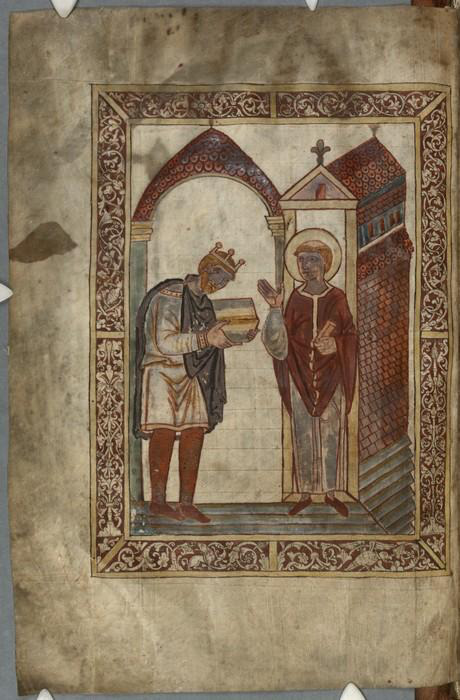
Portrait of King Æthelstan presenting a book to St Cuthbert, by permission of the Master and Fellows of Corpus Christi College, Cambridge: Cambridge, Corpus Christi College, MS 183, f. 1v
11 notes
·
View notes
Text
Con sinceridad
Estas semanas han sido un infierno.
A decir verdad, han sido un infierno en el cielo, pero ayer finalmente pude tomar un respiro de tanto ajetreo interior. Fui al teatro, fue maravilloso.
Pienso que cuando las cosas se mueven tanto internamente es porque estamos en pleno camino de transformación (o, más precisamente, de evolución, tal como me dijo una amiga alguna vez). Nunca más volverá a ser mi vida la de antes. Eso ahora lo sé.
Estos dos últimos años han sido caóticos. He terminado ciclos (¡al fin!), he empezado otros (oh…) e incluso he logrado hacer realidad uno de mis sueños que era estudiar aquí, en Cambridge. Un sueño que he albergado en mí desde hace ya unos años al fin se hizo la verdad que estoy viviendo en este momento y no puedo estar más que feliz.
Pero, tal vez porque ningún sentimiento es absoluto, he vivido mucho dolor estas últimas dos semanas. Desadaptación, tristeza, soledad… cosas de las que usualmente quienes estudian fuera no mencionan en sus grandilocuentes y motivadoras descripciones de sus experiencias, y que, sin embargo, son muy reales, tangibles y estremecedoras. Te comen, te destrozan por dentro, te saturan de paradojas precisamente para que descubras que como casi siempre eres el agente de tu propia mutilación. Una automutilación que, valgan verdades, se hace de manera sigilosa autodescubrimiento. Y entonces descubres que también puedes ser agente de tu propia transformación y, si realmente lo deseas, el personaje principal de tu vida, allí donde siempre parece ser (a corto plazo) más fácil que las riendas las lleve alguien (o algo) más. Al buscar con frenesí algo que me apasione seriamente en la vida, algo a que me dedique por completo, ¿no buscaba yo también eso? ¿No buscaba entregarle las llaves a algo más? Cuando tenía quince o dieciséis años yo no lo sabía. Me martillaba la idea de que no encontrara algo que me apasione, ¡algo, alguien, lo que sea! ¡Cualquier cosa! Buscaba algo donde pueda fijar la mirada, mientras más indiferente hacia mí mejor, tal vez para no mirarme a mí misma.
Ahora lo veo porque desde hace poco he empezado a verme. No ha escudriñarme, solo verme. Poco a poco, lentamente. Estudiar filosofía fue, de hecho, eso: aprender a dirigir la mirada. Un tema sin duda clásico que se actualiza en cada momento y revive, si bien a veces a tientas, con cada pregunta sobre el mismo preguntar. Y también, por cierto, con cada obra.
La representación de Exit The King, escrita por Eugène Ionesco, tuvo lugar ayer en el Corpus Playroom del Corpus Christi College. Un teatro pequeño y acogedor donde todo era negro salvo los muebles, que eran rojos, al igual que la escenografía que cubría por este momento dos de las paredes. El rey Berenger I ha de enfrentar la muerte al final de la obra y no hay modo de escapar de ella. Descubrimos a la reina Marguerite, la primera esposa que tanto odia, como su guía personal hacia la muerte. Lo central es el motivo del tránsito: transitar la muerte como transitar la vida. Negación, sollozos, locura. El rey ha vivido cuatroscientos años, hizo miles de cosas salvo prepararse para morir. Una condición (¿o elección?) que lo acompaña, como bien señala la reina, desde el mismo día en que nació, y de la que, no obstante, prefirió no saber hasta que fue golpeado por su inevitabilidad. ¿Por qué lo querría, en todo caso, si reconocer la propia muerte significaba conocerse a sí mismo? Lo que se le exige ahora es que se despoje de todo. Se le facilita la tarea externa, puesto que su reino se está desmoronando junto a él, pero las ocupaciones internas son cansinas, quejumbrosas, porque después de todo él solo se ha dedicado a acumular, y es allí donde ese principio femenino empieza a tomar acción. Muestra que la capacidad receptiva es también formadora –¿no era el constante vacío, en ocasiones tedio y fastidio, suyo una antelación de la muerte, antelación que el carácter siempre activo del rey evitó? – y le enseña que nos despojamos de muchas cosas para hacernos de nuevo uno. Solo eso, uno. ¿Que no estaba preparado ya? ¿No fueron los cambios que vivió en su vida una preparación para la gran transformación que es la muerte? Pero estaba demasiado ocupado, ensimismado, cansado, enamorado, frenético, abrumado, para poder verlo, que aquí no es más que vivir acorde a ello… que no es más que tomar a la vida como la primera gran transformación a la que, como espejo suyo, ha de seguir la muerte.
Sentí tantas cosas ayer, ¡tantas cosas que solo puedes vivir junto al arte!, tantas, que hasta he tenido fuerzas para empezar a escribir hoy y eso es lo que haré de ahora en adelante. ¡Hay mucho que decir sobre Cambridge!, sí, y también mucho de la experiencia de vivir, de decidir salir fuera de casa y de entrar en tu propio hogar interior al mismo tiempo. Seguiré viendo hacia donde me lleva este despojamiento. Nos vemos a la próxima.
2 notes
·
View notes
Text
Two Vegetarian Prayers of Thanksgiving (one is Gnostic from Nag Hammadi; the other is from Jainism)
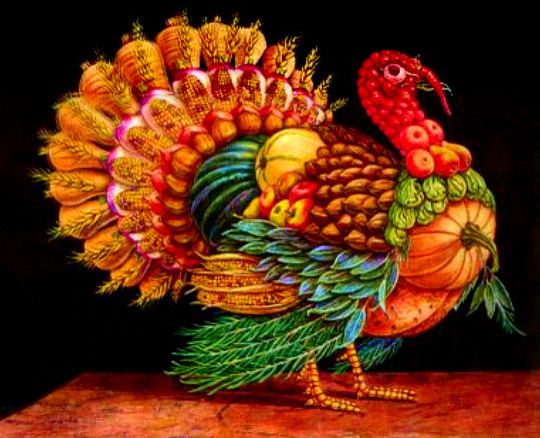
Prayer of Thanksgiving in the Nag Hammadi Library (Gnostic Gospels) and Corpus Hermeticum
This the prayer that they spoke:
“We give thanks to You!
Every soul and heart is lifted up to You,
undisturbed name, honored with the name ‘God’
and praised with the name ‘Father’,
for to everyone and everything (comes) the fatherly kindness
and affection and love,
and any teaching there may be that is sweet and plain,
giving us mind, speech, (and) knowledge:
mind, so that we may understand You,
speech, so that we may expound You,
knowledge, so that we may know You.
We rejoice, having been illuminated by Your knowledge.
We rejoice because You have shown us Yourself.
We rejoice because while we are in (the) body,
You have made us divine through Your knowledge.
“The thanksgiving of the one who attains to You is one thing:
that we know You.
We have known You, Light of mind.
Life of life, we have known You.
Womb of every creature, we have known You.
Womb pregnant with the nature of the Father,
we have known You.
Eternal permanence of the begetting Father,
thus have we worshiped Your goodness.
“There is one petition that we ask:
we would be preserved in knowledge.
And there is one protection that we desire:
that we not stumble in this kind of life.”
“When they had said these things in the prayer, they embraced each other and they went to eat their holy food, which has no blood in it.” *
“Vegetarian food” — footnote from the Marvin Meyer translation of this in, The Gnostic Scriptures.
This passage is also found in the Epilogue of Asclepius, in “HERMETICA,” translated by Sir Walter Scott: “Having prayed thus, let us betake ourselves to a meal unpolluted by flesh [animalia] of living things.”
The G.R.S. Mead translation of the same verse: “With this desire we now betake us to our pure and fleshless meal.”
“With such hopes we turn to a pure meal that includes no living thing.” (Asclepius, translated in “Hermetica”, Brian Copenhaver, Cambridge University Press)
Thanksgiving Prayer (from Jainism)
Start the meal with the seven contemplations, or with whatever traditional grace or prayer you prefer to use to express our gratitude.
This food is the gift of the whole universe: the earth, the sky, numerous living beings and much hard, loving work.
May we eat with mindfulness and gratitude so as to be worthy to receive it.
May we recognize and transform our unwholesome mental formations, especially our greed, and learn to eat with moderation.
May we keep our compassion alive by eating in such a way that we reduce the suffering of living beings, preserve our planet, and reverse the process of global warming.
May we ask for forgiveness from all living beings that we may have harmed, intentionally and unintentionally. May peace and compassion grow in ourselves and extend to all around us.
May we pray that all the people everywhere in the world will avoid inflicting harm on animals and fellow human beings and practice nonviolence and compassion.
We accept this food so that we may nurture our sisterhood and brotherhood, strengthen our community, and nourish our ideal of serving all living beings. (Contemporary Vegan Jain Prayer)
#vegan#go vegan#thanksgiving#vegan thanksgiving#gnostic#vegetarian#jainism#nag hammadi library#hermetica#prayer of thanksgiving
16 notes
·
View notes
Text
Rosalind Franklin's role in discovery of DNA recognised with blue plaque
You've probably heard about James Watson and Francis Crick, the British scientists who got a Nobel Prize for figuring out the structure of DNA in Cambridge in 1953. Maurice Wilkins also shared that prize for his role in the work, but people tend to forget his name. And the name that even the Nobel Prize committee omitted was Rosalind Franklin, a Jewish scientist whose work was the basis for the work that Watson, Crick, and Wilkins did. Unfortunately, Franklin died before the DNA paper was published, which is why the Nobel Prize committee left her name off the award, and which is one of the reasons that people forgot her contribution.
Watson and Crick were Cambridge fellows, and they announced their work at the Eagle pub, which is a nice place owned by Corpus Christi College (my former Cambridge college). For decades, there's been a plaque on the wall of the Eagle proudly declaring that this was the place where Watson and Crick announced their discovery. When I took guests to the Eagle, I used to tell them that it was the place where Watson and Crick were drinking while Rosalind Franklin did the groundwork for their discovery.
Corpus has done good! They've replaced the plaque with one that acknowledges Franklin and Wilkins as well as Watson and Crick. Next time I'm in Cambridge, I will definitely stop off at the Eagle for a drink! Well done, my college!
2 notes
·
View notes
Text

CORPUS CHRISTI COLLEGE, CAMBRIDGE - OLD HALL, WILKINS STAIR & PARKER ROOM, UK
5 notes
·
View notes